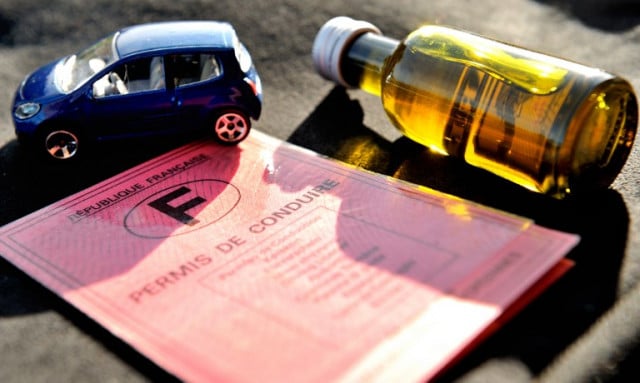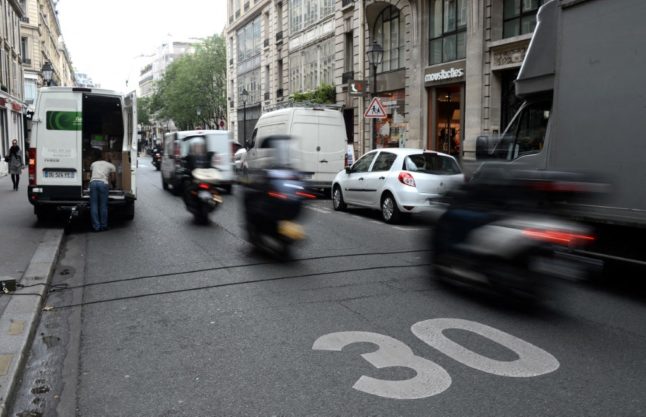France is introducing a new law that will apply to all those caught drink-driving.
From now on drivers will have to pick between either having their licence suspended or having a vehicle ignition breathalyser installed in their cars.
The ignition breathalyser means the car cannot be started unless you first pass a breathalyser test that involves blowing into a device installed in the car.
The devices known as EADs in French (ethylotest anti-démarrage) have been compulsory in France since 2015 on buses.
 (Drink drive offenders can opt to have an ignition breathalyser installed in their vehicles. Photo: AFP)
(Drink drive offenders can opt to have an ignition breathalyser installed in their vehicles. Photo: AFP)
They require the driver's alcohol level to be below 0.2 grams per litre of blood in order for the vehicle to start. The legal limit for everyone else is 0.5 g/l, with drivers with less than three years of experience begin limited to 0.2 g/l.
The new measure will apply to those drivers caught with more than 0.8g/l of alcohol in their blood. Drivers will have to pay out of their own pocket for the devices which cost more than €1,000 and will have to remain in the car for at least five years.
READ ALSO:

Police recorded 123,926 drink driving offences in France in 2017. Photo: AFP
Drink driving is still seen as socially acceptable by many in France, but road safety charities say that it caused the deaths of 1,035 people in 2017.
Police say that they recorded 123,926 drink driving offences that year, which represents 20 percent of all traffic offences.
Alcohol is also said to be behind 58 percent of all road deaths at weekends.
Twenty-nine percent of the people surveyed by France’s Prévention Routière et Assureurs Prévention in 2014 admitted they had driven with more than the legal 0.5 grams/ litre of alcohol in their blood stream.
According to the study titled “Going out, drinking alcohol and driving: the French take too many risks”, 27 percent also claimed they had gotten in a vehicle even though they thought the driver was over the limit.
The head of France's leading motorists group said France had failed to make the same progress as the UK.
“In contrast to the UK drink-driving is not yet socially unacceptable in France,” Pierre Chasseray, the head of driver's group “40 million d'automobilistes” told The Local at the time.
READ ALSO:
Here are the rules about drinking before you drive, but in general the official advice is that it's better to shun alcohol altogether if you’re about to hit the road.
With the limit being just one small beer or glass or wine – and even that can sometimes put you over the permitted level – full sobriety is the best way to go when you get behind the wheel.
These are the most severe punishments possible, but judges can and do impose lesser ones. Their punishments may depend on the consequences of the driver's actions, such as whether there was an accident and whether people were hurt or even killed.
-
Driving with more than 0.8g/l of alcohol in the blood can lead to a two-year jail sentence, a three-year driving ban or installing an EAD in the vehicle, and a fine of up to €4,500.
-
The above punishment can also be handed out to anyone who refuses to take a breathalyser test.
-
Any subsequent drink driving offence can land you four years in jail, a fine of €9,000, and a three-year driving ban (or getting an EAD installed)
-
All of the above offences will make you lose up to six of the 12 points on your licence, and you vehicle may be confiscated.
-
Driving under the influence of drugs or failing to cooperate with a drugs test will land you up to two years in jail, a €4,500 fine and a three-year driving ban.
-
Driving with between from 0.5g/l and 0.8g/l of alcohol in your blood can leave you with a fine of €135 (reduced to €90 if you pay within days of receiving the fine), the loss of six licence points, and a three-year suspension of your licence.
While you might escape paying a fine if you are caught by a speed camera driving in France in a foreign-registered car, this will of course not apply if you are caught drink driving, as this entails contact with a police officer who has stopped you.



 Please whitelist us to continue reading.
Please whitelist us to continue reading.
What’s the use of having a Vehicle Ignition Breathalyser installed in your car, when you can just get a child or someone who hasn’t been drinking to breath into it so that you can start your car?
The devices have a camera in them to record who’s blowing. They also require you to blow again after a period of time in order to continue driving.
Agree with Daniela … but also one glass of wine or a small beer … ambiguous? Wine is higher in alcohol content than beer so I am having trouble with the “arithmetic”?
Beer is usually weaker than wine (though not always these days) but a small beer is usually bigger than a glass of wine so the alcohol consumption is probably about the same, unless you’re drinking the special small beers they serve sometimes in bars, in which case the alcohol content may also be the same. Drinks and glasses all vary in strength and size so it’s bound to be a bit ambiguous, but it seems to be a rough estimate that will keep folk out of trouble. The best advice if you’re driving is don’t drink at all and the small amount that is permissible makes it hardly worth bothering with – so why bother?